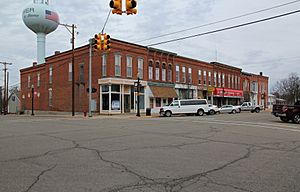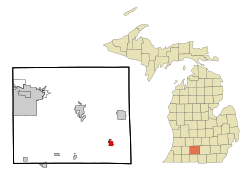Homer, Michigan facts for kids
Quick facts for kids
Homer, Michigan
|
|
|---|---|
|
Village
|
|
 |
|
| Motto(s):
"Homer is home"
|
|

Location of Homer, Michigan
|
|
| Country | United States |
| State | Michigan |
| County | Calhoun |
| Township | Homer |
| Area | |
| • Total | 1.44 sq mi (3.74 km2) |
| • Land | 1.40 sq mi (3.61 km2) |
| • Water | 0.05 sq mi (0.12 km2) |
| Elevation | 991 ft (302 m) |
| Population
(2020)
|
|
| • Total | 1,575 |
| • Density | 1,129.03/sq mi (435.81/km2) |
| Time zone | UTC-5 (Eastern (EST)) |
| • Summer (DST) | UTC-4 (EDT) |
| ZIP code |
49245
|
| Area code(s) | 517 |
| FIPS code | 26-38920 |
| GNIS feature ID | 0628509 |
Homer is a small village located in Calhoun County in the U.S. state of Michigan. It is part of the larger Battle Creek area. In 2020, about 1,575 people lived there. Homer has a rich history, from its early days as a settlement to its famous high school baseball team.
Contents
History of Homer
Early Settlement and Naming
A man named Milton Barney came to the Homer area in 1832. He was from Lyons, New York. He explored the land and then returned with his family and workers. They settled by the Kalamazoo River.
Soon after, Barney hired Osha Wilder to plan a village. They called this new village Barneyville. Milton Barney built a store, a sawmill, and a hotel there. In 1834, when a post office was set up, the village was renamed Homer. This was because many residents had moved from a village named Homer in Cortland County, New York. Homer officially became a village in 1871.
Native American Relations
Early settlers found the Potawatomi native people to be friendly. Children from both groups often played together. Chiefs like Ne-au-to-beer-saw (also called Leather-nose) and Wopkezike are mentioned in stories from that time.
The native population was large until 1840. At that time, the U.S. Government moved many Native Americans to lands west of the Mississippi River. This was done under the Indian Removal Act and the 1833 Treaty of Chicago. Even after the treaty, the Potawatomi and settlers lived peacefully together for many years. Later, about 250 Native Americans from the area were moved to Kansas. Chief Ne-au-to-beer-saw sadly drowned while trying to return from Canada.
The Homer Mills
The first Homer mills were built between 1837 and 1838. A group of people, including Milton Barney, owned them. This building was later known as Smith, Lewis, & Redfield. It changed owners several times. Sadly, this original mill burned down on January 25, 1886.
A "new" Homer mills building, which was a well-known landmark, also burned down. This happened in the early morning of May 16, 2010. It was thought to be the biggest fire in the town since the high school burned in 1943. The fire was so strong that many fire departments from nearby towns came to help. Ashes even rained down on the town, and fire trucks had to patrol to prevent houses from catching fire. The cause of this fire is still unknown.
High School Baseball Success
The Homer High School varsity baseball team holds a national record. They won 75 games in a row! This amazing winning streak started at the beginning of the 2004 season. It finally ended in the state championship game in 2005. From 2003 to 2006, the team had an incredible record of 143 wins and only 6 losses. They won two state championships, in 2004 and 2006. Their success was even shown on ESPN's "50 States in 50 Days" show about Michigan.
Education
The Homer Community Schools District serves students in Homer and Homer Township. Many students from nearby villages and towns also attend Homer schools. This is possible because of Michigan's "school of choice" program.
Geography
Homer is a small village. It covers a total area of about 1.45 square miles (3.74 square kilometers). Most of this area, about 1.40 square miles (3.61 square kilometers), is land. The rest, about 0.05 square miles (0.12 square kilometers), is water.
Population Information
| Historical population | |||
|---|---|---|---|
| Census | Pop. | %± | |
| 1870 | 685 | — | |
| 1880 | 893 | 30.4% | |
| 1890 | 1,063 | 19.0% | |
| 1900 | 1,097 | 3.2% | |
| 1910 | 1,008 | −8.1% | |
| 1920 | 1,076 | 6.7% | |
| 1930 | 1,108 | 3.0% | |
| 1940 | 1,145 | 3.3% | |
| 1950 | 1,301 | 13.6% | |
| 1960 | 1,629 | 25.2% | |
| 1970 | 1,617 | −0.7% | |
| 1980 | 1,791 | 10.8% | |
| 1990 | 1,758 | −1.8% | |
| 2000 | 1,851 | 5.3% | |
| 2010 | 1,668 | −9.9% | |
| 2020 | 1,575 | −5.6% | |
| Source: Census Bureau. Census 1960– 2000, 2010. | |||
2010 Census Details
In 2010, there were 1,668 people living in Homer. There were 615 households and 435 families. The village had about 1,191 people per square mile. Most residents (97.7%) were White. A small percentage were African American (0.3%), Native American (0.4%), or Asian (0.4%). About 2.8% of the population identified as Hispanic or Latino.
The average age of people in the village was 33.5 years old. About 30.3% of residents were under 18 years old. About 12.4% were 65 years or older. The population was almost evenly split between males (48.6%) and females (51.4%).
Notable People
- Greg Barton, an Olympic gold medalist
- Josh Collmenter, a Major League Baseball player
See also
 In Spanish: Homer (Míchigan) para niños
In Spanish: Homer (Míchigan) para niños
 | Percy Lavon Julian |
 | Katherine Johnson |
 | George Washington Carver |
 | Annie Easley |

